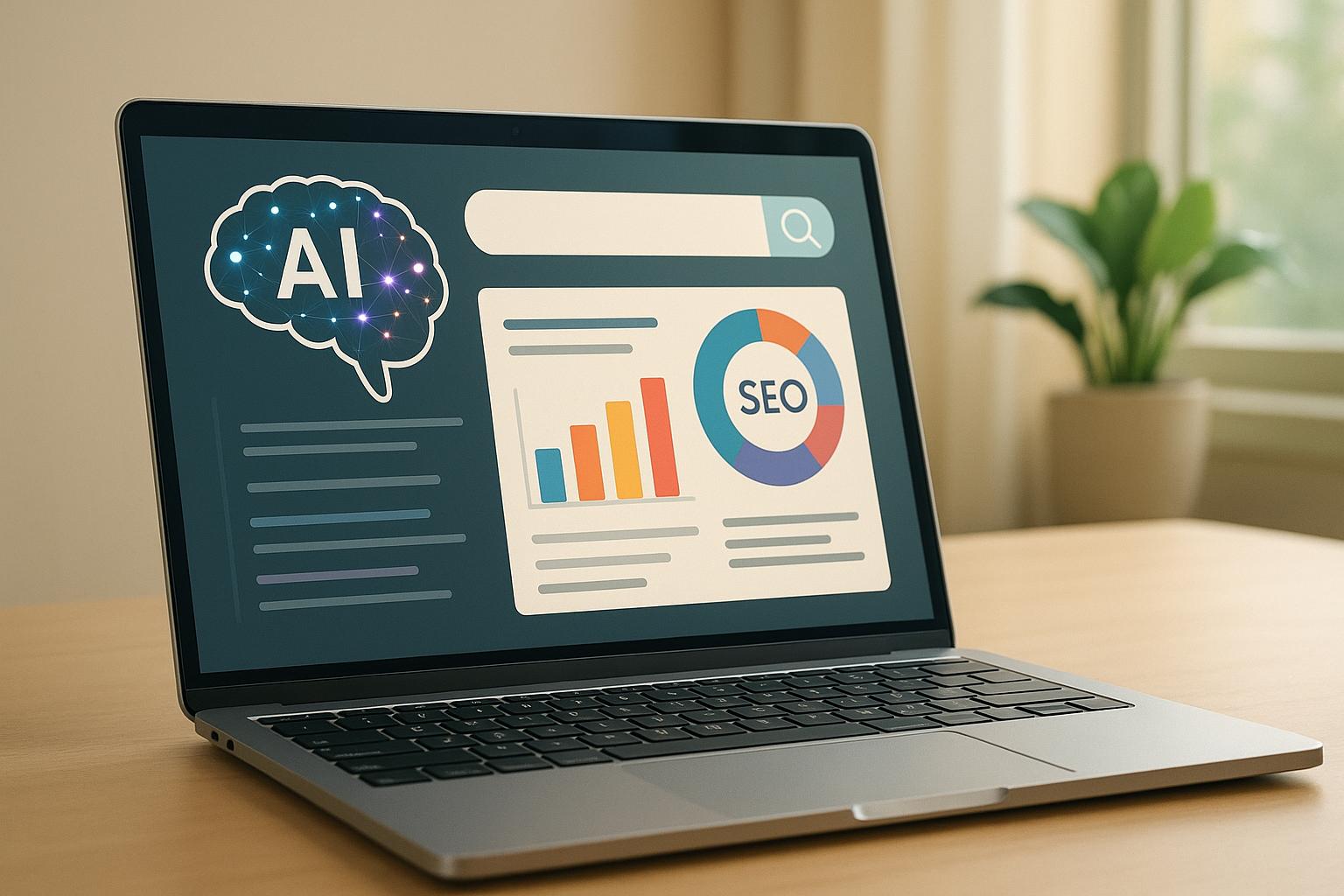

How to Win SEO in 2026: AI-Aware Strategies

How to Win SEO in 2026: AI-Aware Strategies
 08-09-2025 (Last modified: 03-02-2026)
08-09-2025 (Last modified: 03-02-2026)
As the digital marketing landscape continues to evolve, search engine optimization (SEO) in 2026 is no longer just about keyword rankings and organic traffic. With AI-driven tools and platforms reshaping how users search for information and interact with content, marketers, small business owners, and SEO professionals need to rethink their strategies. Lindsay Hely, co-founder of Pathfinder SEO, shared her insights and expertise on adapting to this rapidly evolving space during a recent discussion, offering actionable advice on how to stay competitive.
Understanding the Shift: What AI Means for SEO
The core principles of SEO – visibility, relevance, and content quality – remain the same. However, AI has added new layers to the game. Lindsay explains that search engines like Google now incorporate AI-generated overviews, answer engine optimization (AEO), and generative engine optimization (GEO). These tools allow users to receive synthesized, conversational answers directly in search results. As a result, businesses face challenges like reduced click-through rates, especially for informational queries, but also new opportunities to be part of the AI-driven conversations.
How AI is Changing Search
- AI Overviews in Search Results: AI-generated answers, like Google’s "AI mode" or "AI overviews", provide instant responses to user queries directly on the search engine results page. This reduces the need for users to click on traditional search results, impacting session counts for websites.
- Emergence of Long-Tail Queries: With AI and voice search, queries have become more conversational and specific. Instead of typing "best restaurants Boston", users now ask, "What are the best restaurants in Boston for families with kids?" SEO strategies need to address these highly targeted, audience-specific needs.
- Generative Platforms and Search: Platforms like ChatGPT, Gemini, and Perplexity provide users with detailed, conversational responses. They represent an emerging channel businesses must optimize for, in addition to traditional search engines.
sbb-itb-6e49fcd
What Still Works: The SEO Fundamentals
Despite AI’s influence, the foundation of SEO remains relevant. Lindsay emphasizes that businesses should continue focusing on these tried-and-true tactics:
1. Helpful, Audience-First Content
Content that answers users’ questions and provides value remains critical. However, the era of creating generic, one-size-fits-all content is over. Instead, focus on hyper-specific, niche topics that align with your target audience’s needs. Incorporating clear structure, scannable headers, and user-friendly formatting ensures your content resonates.
Example:
Instead of creating a broad guide like "How to Start a Blog", consider a more targeted piece like "How to Start a Blog for Interior Designers."
2. Strong Site Foundations
Your website’s technical performance directly impacts its SEO success. Factors like page speed, mobile-friendliness, security, and usability remain cornerstones of an effective SEO strategy. Google uses user engagement signals – like time spent on a page and bounce rates – to assess website quality.
3. On-Page Optimization
Even in 2025, on-page SEO tactics such as well-structured meta tags, descriptive headers, and internal linking matter. Structured data (schema markup) plays an increasingly important role, helping search engines and AI tools interpret your content.
4. Off-Site SEO
Building high-quality backlinks and earning mentions across other websites continue to boost your domain authority and visibility. Authenticity matters – focus on genuine relationships and partnerships to acquire links, rather than shortcuts like purchasing them.
Evolving Strategies: Where to Focus in 2026
To stay competitive, businesses need to adapt their SEO strategies to include newer, AI-aware practices. Lindsay highlights a few areas to prioritize:
1. Showcasing Human Expertise
In a world flooded with AI-generated content, demonstrating genuine human expertise and firsthand experience is more critical than ever. Businesses can differentiate themselves by:
- Adding personal anecdotes and stories to blogs and website content.
- Featuring author bios with credentials and expertise on blog posts.
- Including testimonials, case studies, and real images rather than stock photography.
2. Customizing Your Calls-to-Action (CTAs)
Generic CTAs like "Subscribe to our newsletter" are less effective than tailored offers that match user intent. For example, if a blog post discusses SEO strategies, offering an "SEO Checklist" as a downloadable resource can significantly increase conversions.
3. Leveraging Google Reviews
AI tools increasingly rely on user reviews to summarize and assess a brand’s credibility. Businesses should focus on acquiring authentic reviews and responding to them strategically. Reviews help establish trust and can influence AI-generated recommendations.
4. Investing in Topical Depth
Rather than sporadically addressing topics, businesses should focus on creating clusters of related content to demonstrate expertise in specific areas. For example, launching a blog series on "SEO in the Age of AI" can help establish your authority in this niche.
5. Optimizing for AI Platforms
Emerging technologies like LLMs (large language models) TXT protocols are becoming essential for helping AI tools accurately digest website content. While still developing, these tools can provide an edge in optimizing for platforms like ChatGPT or Perplexity.
Adapting Your SEO Strategy for the Future
Lindsay offers a holistic approach to SEO that combines foundational practices with emerging techniques. Here are her recommendations for futureproofing your SEO strategy:
- Think Holistically: SEO should align with your broader business goals and complement other marketing channels like email marketing, social media, and paid search.
- Measure and Communicate Results: Use tools like Google Analytics and Search Console to track changes in impressions, click-through rates, and AI-driven traffic. Share these insights with your team or clients to highlight progress.
- Focus on Visibility Beyond Clicks: In an AI-driven world, brand visibility matters as much as traffic. Even if users don’t click, being cited in AI-generated summaries builds awareness and increases the likelihood of conversions down the line.
Key Takeaways
- AI is Reshaping SEO: Strategies should account for AI-generated search results, conversational queries, and platforms like ChatGPT.
- Foundations Still Matter: Technical SEO, high-quality content, and user experience remain crucial for ranking success.
- Human Expertise Wins: Personalize content with first-person anecdotes, real-life testimonials, and genuine insights to stand out in an AI-dominated space.
- Engagement Is Key: Focus on user intent, call-to-action alignment, and improving dwell time on your website.
- Reviews Drive Trust: Actively cultivate Google reviews to improve credibility and visibility in search and AI platforms.
- Tailored CTAs Work: Create custom offers that match the specific needs of your audience at each stage of their journey.
- Adapt to AI Tools: Incorporate emerging practices like LLM TXT files to optimize for AI-driven search platforms.
- Track Visibility, Not Just Traffic: Use metrics like impressions and brand mentions to measure your SEO success.
Conclusion
SEO in 2025 is as much about embracing change as it is about sticking to the fundamentals. While AI adds complexity to the landscape, it also offers opportunities for businesses to connect with audiences in innovative ways. By prioritizing human expertise, adapting to conversational search behaviors, and leveraging emerging technologies, marketers and business owners can thrive in this new era of search. The key is to remain audience-focused and open to evolution – because as Lindsay Hely puts it, SEO is more about "evolution than change."
Source: "What’s Working in SEO in 2025" – GreenGeeks, YouTube, Aug 18, 2025 – https://www.youtube.com/watch?v=Y4Vzg3Fg1T8
Use: Embedded for reference. Brief quotes used for commentary/review.
Related Blog Posts
say hello to easy Content Testing
try PageTest.AI tool for free
Start making the most of your websites traffic and optimize your content and CTAs.
Related Posts

 05-03-2026
05-03-2026
 Ian Naylor
Ian Naylor
Cumulative Layout Shift: Debugging Guide
Fix layout shifts by setting media dimensions, reserving ad/embed space, optimizing fonts, and using Chrome DevTools and PerformanceObserver to lower CLS.

 03-03-2026
03-03-2026
 Ian Naylor
Ian Naylor
How to Use AI for Dynamic Content Personalization
Step-by-step guide to using AI to collect behavior data, segment users, create personalized headlines and CTAs, run tests, and optimize conversions.

 02-03-2026
02-03-2026
 Ian Naylor
Ian Naylor
AI Content Personalization: Expert Guide
AI personalization uses unified profiles, predictive analytics, and real-time updates to serve tailored content that boosts conversions.
